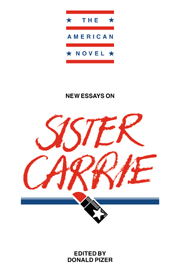Book contents
- Frontmatter
- Contents
- Series Editor's Preface
- Note on the Text
- 1 Introduction
- 2 Carrie's Blues
- 3 A Portrait of the Artist as a Young Actress: The Rewards of Representation in Sister Carrie
- 4 Sister Carrie: The City, the Self, and the Modes of Narrative Discourse
- 5 Who Narrates? Dreiser's Presence in Sister Carrie
- Notes on Contributors
- Selected Bibliography
4 - Sister Carrie: The City, the Self, and the Modes of Narrative Discourse
Published online by Cambridge University Press: 05 June 2012
- Frontmatter
- Contents
- Series Editor's Preface
- Note on the Text
- 1 Introduction
- 2 Carrie's Blues
- 3 A Portrait of the Artist as a Young Actress: The Rewards of Representation in Sister Carrie
- 4 Sister Carrie: The City, the Self, and the Modes of Narrative Discourse
- 5 Who Narrates? Dreiser's Presence in Sister Carrie
- Notes on Contributors
- Selected Bibliography
Summary
WE NOW know that the summer of 1894 was an intellectual turning point for Theodore Dreiser. At that time, as a reporter for the Pittsburgh Dispatch, he would spend his free time in the public library reading Herbert Spencer and Honore de Balzac. The experience, he has told us, “quite blew me, intellectually, to bits.”
It is hard to imagine Dreiser, with only a semester of college and no formal training in philosophy, reading Spencer in any sophisticated way. But when one looks at the uses that Dreiser made of Spencer – first in his philosophical essays as “The Prophet,’ and later in Sister Carrie – one must modify this conclusion. Spencer's philosophy is a nineteenth-century combination of mechanistic and romantic belief. Like the mechanistic Thomas Hobbes, Spencer believed that we live in a world composed of matter in motion: such matter makes up the natural process, which is both repeatable and hence describable in scientific terms. Like the romantics, Spencer also believed that nature symbolically reflected its inner meaning, so that to read the universe was to read the unfolding of nature and to understand the correspondences that existed between man and (say) the animal world.
The key to Spencer's philosophy was his belief in force – not a life force as in Bergson, where the impetus comes from within, but a force that manifested itself from without. Force itself is a constant (what Spencer called the “persistence of force”).
- Type
- Chapter
- Information
- New Essays on Sister Carrie , pp. 65 - 86Publisher: Cambridge University PressPrint publication year: 1991
- 9
- Cited by



